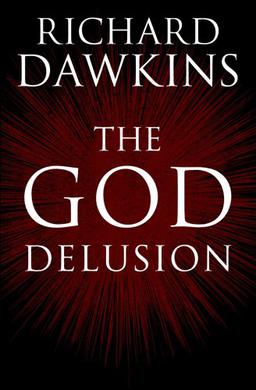
The God Delusion
The God Delusion is a 2006 book by British evolutionary biologist and ethologist Richard Dawkins. In The God Delusion, Dawkins contends that a supernatural creator, God, almost certainly does not exist, and that belief in a personal god qualifies as a delusion, which he defines as a persistent false belief held in the face of strong contradictory evidence. He is sympathetic to Robert Pirsig's statement in Lila (1991) that "when one person suffers from a delusion it is called insanity. When many people suffer from a delusion it is called religion."[1] In the book, Dawkins explores the relationship between religion and morality, providing examples that discuss the possibility of morality existing independently of religion and suggesting alternative explanations for the origins of both religion and morality.
For the documentary film, see The Root of All Evil?Author
English
2 October 2006
United Kingdom
464
211/.8 22
BL2775.3 .D39 2006
In early December 2006, it reached number four in the New York Times Hardcover Non-Fiction Best Seller list after nine weeks on the list.[2] More than three million copies were sold.[3] According to Dawkins in a 2016 interview with Matt Dillahunty, an unauthorised Arabic translation of this book has been downloaded 3 million times in Saudi Arabia.[4] The book has attracted widespread commentary and critical reception, with many books written in response.
Background[edit]
Dawkins has presented arguments against creationist explanations of life in his previous works on evolution. The theme of The Blind Watchmaker, published in 1986, is that evolution can explain the apparent design in nature. In The God Delusion he focuses directly on a wider range of arguments used for and against belief in the existence of a god (or gods).
Dawkins identifies himself repeatedly as an atheist, while also pointing out that, in a sense, he is also agnostic, though "only to the extent that I am agnostic about fairies at the bottom of the garden".[5]
Dawkins had long wanted to write a book openly criticising religion, but his publisher had advised against it. By 2006, his publisher had warmed to the idea. Dawkins attributes this change of mind to "four years of Bush" (who "literally said that God had told him to invade Iraq").[6][7] By that time, a number of authors, including Sam Harris and Christopher Hitchens, who together with Dawkins were labelled "The Unholy Trinity" by Robert Weitzel, had already written books openly attacking religion.[8] According to the Amazon.co.uk retailer in August 2007, the book was the best-seller in their sales of books on religion and spirituality, with Hitchens's God is Not Great: How Religion Poisons Everything coming second. This led to a 50% growth in that category over the three years to that date.[9]
Legal repercussions in Turkey[edit]
In Turkey, where the book had sold at least 6,000 copies,[72] a prosecutor launched a probe into whether The God Delusion was "an attack on holy values", following a complaint in November 2007. If convicted, the Turkish publisher and translator, Erol Karaaslan, would have faced a prison sentence of inciting religious hatred and insulting religious values.[73] In April 2008, the court acquitted the defendant. In ruling out the need to confiscate copies of the book, the presiding judge stated that banning it "would fundamentally limit the freedom of thought".[74]
Dawkins' website, richarddawkins.net, was banned in Turkey later that year after complaints from Islamic creationist Adnan Oktar (Harun Yahya) for alleged defamation.[75] By July 2011, the ban had been lifted.[76]
Chronological order of publication (oldest first)